Generative Search Optimization (GEO): A Simple Guide
What is Generative Search Optimization (GEO)?
Generative Search Optimization (GEO) focuses on making content that AI search engines and models like ChatGPT and Google’s AI Overviews can use. Unlike traditional SEO practices, which focus on web pages to rank higher in search results, GEO efforts ensure that your content is selected and used by AI systems to provide accurate and comprehensive responses to user queries.
This guide comes with expert insights from our SEO Director, Victor Perez. Here, we’ll share how you can leverage GEO to keep your business relevant in search engine results.
How Do Generative AI Answer Engines Work?
Unlike traditional search engines, generative AI uses large language models (LLMs) to combine information from many sources and create direct, conversational replies, instead of just showing a list of “blue” links. ChatGPT pioneered and paved the way for generative AI answers which give direct and succinct answers to users, making for a much better user experience.
Here, we see a comparison of truck accident lawyers in Los Angeles, as an answer to a chat query:
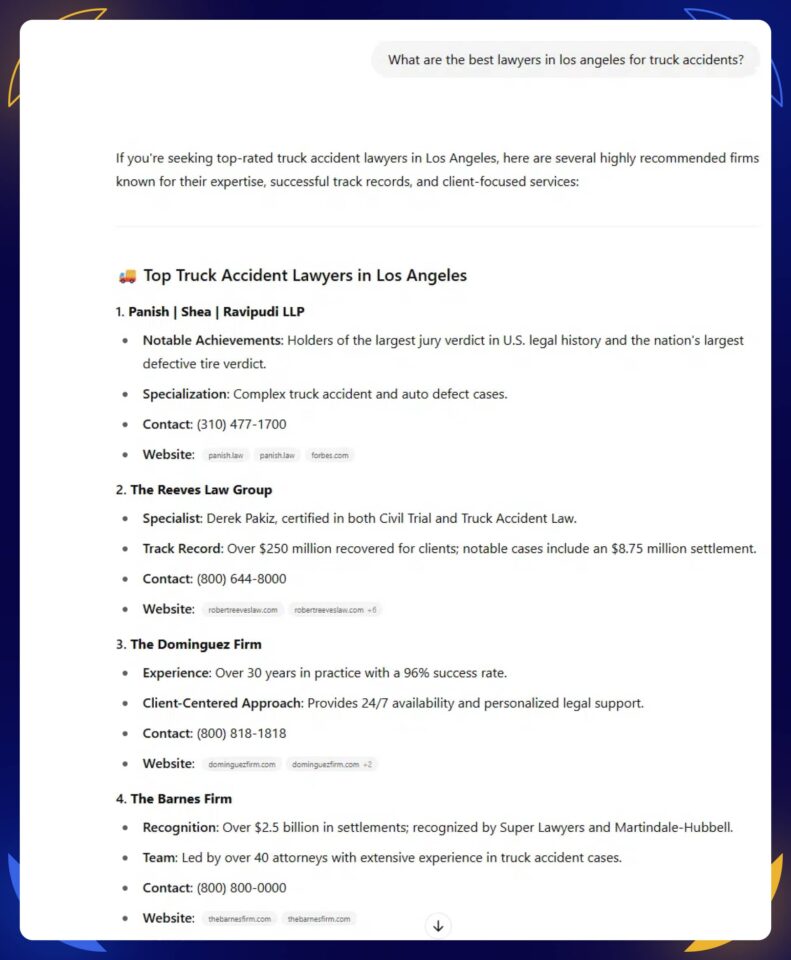
Ideally, you’d want your business to be mentioned in these AI-powered search results.
What is LLMs.txt?
LLMs.txt is a proposed plain-text Markdown document to aid large language models (LLMs) in understanding and navigating your website. You essentially curate a list of high-quality content from your website that you want LLMs to prioritize in their training, and host it at the root of your domain. You can read in more details about the file at llmstxt.org. In theory, similar to how robots.txt and sitemap.xml files help search engines get context of your website, such a file would help AI tools such as ChatGPT and Anthrophic.
But no major LLM provider currently supports such a file, through Anthropic has its own LLMs.txt. In practice, as of now, GEO doesn’t rely on any aspect of creating a LLMs.txt file.
How is GEO Different From SEO?
SEO focuses on ranking higher in search engine results by using the right keywords, getting backlinks, using meta tags, and making technical improvements to your site. The goal is to get more people to click and visit your site.
GEO, on the other hand, focuses on making content useful for AI platforms like ChatGPT or Google’s AI Overviews. These platforms use content from different sources to create direct answers to people’s queries. Hopefully, one of these sources is your site.
What’s working differently from traditional SEO is the focus on comprehensive answers rather than keyword density.
Below is an overview of the differences between GEO and SEO:
| Feature/Aspect | Search Engine Optimization (SEO) | Generative Search Optimization (GSO/GEO) |
|---|---|---|
| Primary Goal | Rank higher in search engine results pages (SERPs) for organic clicks | Content is featured within AI-generated responses (e.g., ChatGPT and Perplexity) |
| Search Engine Focus | Traditional search engines like Google, Bing, Yahoo | AI-driven search engines and generative AI models |
| How Users View Information | A list of ranked links for the user to click and explore | Summaries and conversational responses from multiple sources |
| Key Performance Indicators (KPIs) | Keyword rankings, click-through rate (CTR), and oganic search traffic, | Impressions in AI-generated responses, brand mentions, and citation accuracy |
| Authority Signals | Backlinks from reputable sources, domain authority, content quality | Expertise, experience, authority, and trustworthiness (E-E-A-T) |
| Technical Aspects | Site speed, mobile-friendliness, schema markup, crawlability, and indexability. | Focus on clear site architecture, allowing AI crawlers, optimizing for natural language processing (NLP), and ensuring content is easily parsable by AI models. |
Digital marketing experts hold differing views on whether SEO and GEO are the same or different.
Andreessen Horowitz (a16z) argues that GEO represents a fundamental shift from traditional SEO, saying that in the SEO era, visibility meant ranking high on a results page, but with the rise of AI- driven platforms, visibility now means appearing directly in AI-generated answers. This change means there is a need to shift entire strategies to focus on content optimized for LLMs.
Contrarily, Ahrefs Director of Marketing Ryan Law contends that GEO is simply an extension of SEO, stating that the core mechanisms for improving visibility in AI-generated outputs are consistent with traditional SEO practices.

As long as “content” remains the primary medium for both LLMs and search engines, the core mechanisms of influence will likely remain the same.

Rand Fishkin of SparkToro emphasizes that the essence of SEO remains unchanged, even as platforms evolve. He believes that regardless of the platform—be it traditional search engines or AI-driven models—the fundamental goal is to optimize content to reach audiences wherever they seek information.

Search Everywhere Optimization = influence audiences in all the places they go to consume content about your topic. The acronym doesn’t change. The messaging fits with whatever platforms win the AI wars, whichever networks win the social media battles, and whatever new discovery tools emerge thereafter.

So what does this mean for your business? Do your SEO efforts still matter?
As it is today, SEO and GEO may overlap in many cases, but in competitive markets and larger cities, they can diverge significantly. By nature, generative AI is unpredictable and creative.

In practice, ChatGPT vs. Google SERP outcomes can vary—especially in densely populated markets. For example, lawyers who pay for listings on directory sites (e.g., Avvo or Forbes) may appear prominently in ChatGPT answers even if they rank poorly in organic Google search. Thus, in larger cities with many directory placements, there is more divergence than for niche queries in smaller markets.

Why Generative Search Optimization Matters for Businesses
GEO helps your business appear in AI-generated answers, not just traditional search results, reaching a broader and more engaged audience as search habits evolve. Adopting GEO into your digital marketing strategy helps your business stay ahead as generative AI tools become the norm.
Malloy Law Offices, a Maryland law firm, increased its visibility in AI-generated search results by working with an AI strategist. Within two months, they claim that they saw a 23% rise in inquiries. Many prospects found them through ChatGPT and similar tools. The firm restructured key service pages, optimizing content specifically for AI and focused on clear, direct answers and well-organized content, as well as increasing mentions in authoritative sources.

It’s not just about stuffing keywords; it’s about showing up when someone asks an AI assistant, “Who’s the best lawyer near me?” A business that fails to take advantage of AI search as its own marketing channel will soon be left behind.

Christian Simpson of Christian Crash Law also claims a 15% rise in qualified leads from AI-driven searches in the past six months. He changed the content strategy to answer specific legal questions conversationally. Topics like the social media impact on injury cases and questions to ask before hiring an attorney have done well in generative search results by addressing common client concerns.
For instance, content on distance communication options with attorneys during recovery, which didn’t rank well on Google, became a top lead generator through platforms like ChatGPT and Perplexity, bringing in 3-4 qualified consultations each week.

For attorneys looking to capitalize on this, I recommend creating content that mimics how you’d actually explain legal concepts to clients in person. The AI tools seem to favor authentic expertise over marketing language, which aligns perfectly with how we prefer to practice law anyway.

How Quickly Can Content Get Cited in Generative Search?
Although rankings on ChatGPT mimic those of Google Search, that does not mean that you can rank as quickly as you can on Google. There is a clear delay in which data is added and indexed on ChatGPT as well as other AI models. This may mean a disadvantage to new businesses just starting out with their digital marketing campaigns. (Best time to start SEO is yesterday).
When it comes to GEO, the same methods for ranking small businesses are being used on at least ChatGPT. Since a lot of the rankings lean on what Google has accomplished with their algorithm, there are only a few action items that may help the process of showing up on AI platforms like ChatGPT.
Strategies for Effective Generative Search Optimization
There are many ways to significantly boost source visibility for generative search engines. Here are some of the most effective tactics to successfully implement GEO:
Incorporate GEO into Your Existing Strategy
- Develop a GEO Strategy That Aligns With Your Overall Marketing Goals
You can start by researching your target audience. Learn how they use AI search engines and what questions they ask. Find out which AI tools they use, like ChatGPT, and look at the kind of content these tools use to make answers. Pay attention to longer, conversational questions, not just short keywords. - Revise and Optimize Existing Content for GEO
Revisit all your pages and make sure that all the content has value. If not, revise them to provide correct, original, and current information that directly answers a question. Use clear headings, short paragraphs, and bullet points to make the text easy to read, choosing words that people commonly use.

At OTM, we focus on quality content that is best for users over anything else. Our combined strategies for content creation have avoided tactics like overstuffing, or chasing of larger word counts.

Understand User Intent in Generative Search
In the changing world of search, it’s important to understand what people really want to find. This means more than just looking at keywords. We need to understand the context, goals, and subtleties of how people speak.
Someone searching for “best teeth whitening near me” likely has a transactional intent, meaning they’re ready to book or compare services soon. Meanwhile, a query like “Is teeth whitening safe during pregnancy?” shows informational intent, where the user is still researching before making any decisions.
- For informational intent queries:
- Use direct answers. Immediately provide an answer in the first sentence of your content.
- Write clear headings and subheadings. Make sure your headings accurately describe the topic in that section, like this blog post published on 1-Tom-Plumber’s website about how faucets work.

- Give a summary at the beginning of longer articles – Adding a Table of Contents (TOC) for long articles helps create section anchors and context for AI to pull accurate, labeled information.
An example of this is this content from Mr. Henderson Heating, Cooling, & Plumbing Services, which uses a table of contents for its post about fixing a leaky faucet, with each section hyperlinked for easier navigation.

- Break down complex topics using lists and bullet points – Bulleted lists help provide content in chunks, which makes them more likely to be pulled into AI-generated summaries or overviews.
- For navigational intent queries:
- Consistent business branding – Generative search engines check name consistency to link content across platforms accurately. Use the same brand name spelling on your site, metadata, Google Business Profile, and social platforms. Mention your brand early in page titles, meta descriptions, and hero sections.
- Clear website branding – AI-generated summaries often mention your site and what you offer. Ensure your homepage and About page clearly state:
- Who you are
- What you do
- Where you are (if relevant)
Keep your menus and page titles simple and easy to understand, such as Services, About Us, and Contact Us pages. Always use consistent logos, colors, and fonts, and include a brief brand description in your footer and metadata.
- For commercial or transactional intent queries:
- Provide short but complete answers to possible customer concerns. Generative AI prefers clear, complete answers that can be easily used in summaries and snippets.
- Make your contact info easy to find. Put your business phone number where people can see it easily on your website. Aesthetic Dental Arts shows their phone number at the top of their site.

- Feature client testimonials and case studies. Adding client testimonials and case studies makes your content more trustworthy and provides AI systems with definitive answers when people ask about quality or results.
Create Authoritative and Comprehensive Content
For generative search, top-quality content by experts is essential. AI values authoritative and trustworthy information that offers depth, accuracy, and unique insights. Expertise makes your content more credible, boosting its chance in AI overviews.
- Write high-quality content that proves your expertise
Adding credibility to your content is essential for both humans and large language models (LLMs) to trust your business.
You can prove your expertise by presenting case studies, client testimonials, and putting an author bio at the end of your blog posts, like this one for attorney Michelle L. Donovan from the law firm Broening Oberg Woods & Wilson, P.C.
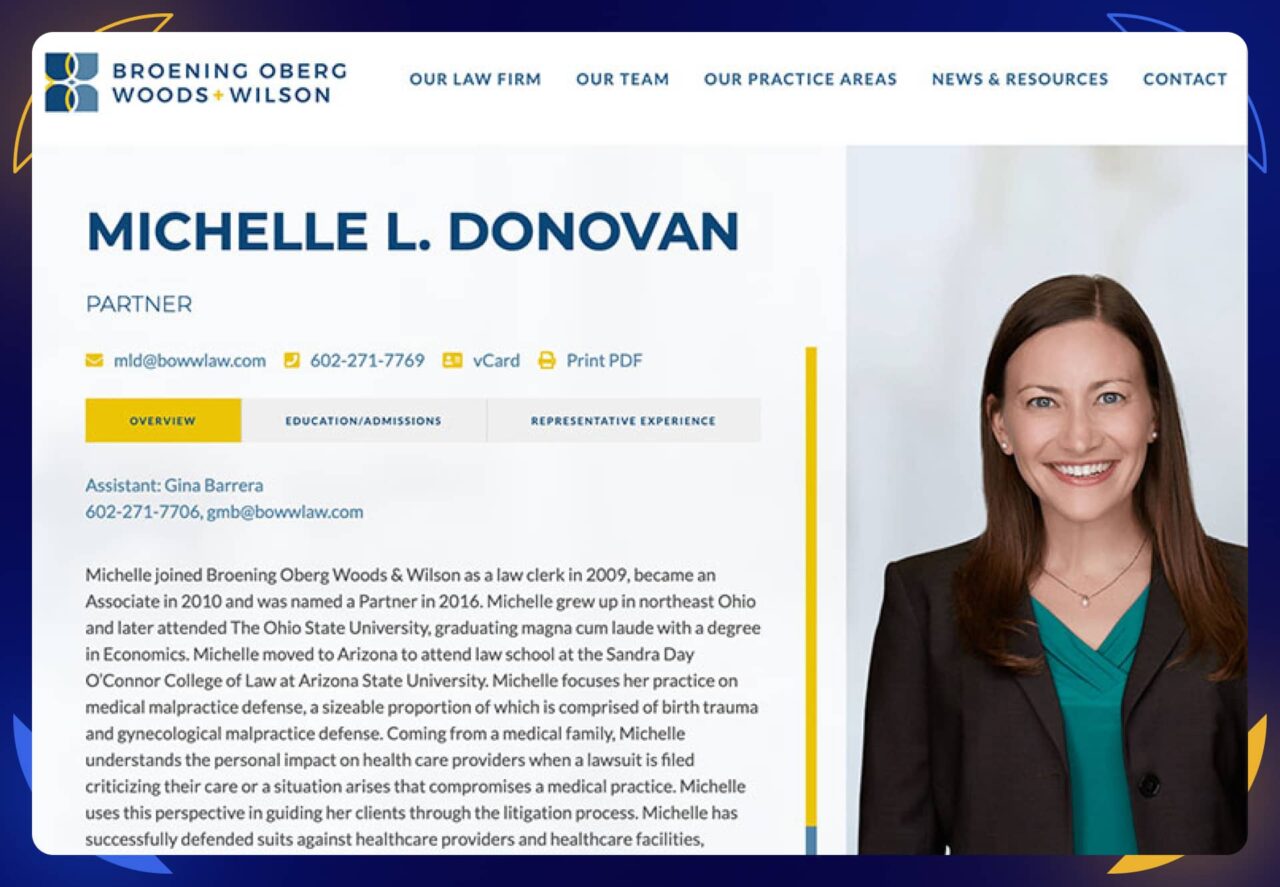
- Create FAQ pages to address common questions about your business
Another way to get your content in AI summaries is to have an FAQ page that talks about your business. This can include details about your business, such as payment options, your open hours, and how to book a consultation.
Below is an example of an FAQ page about your business, as seen on Kitchen Creations’ website, a Denver-based kitchen and bath remodeling company.
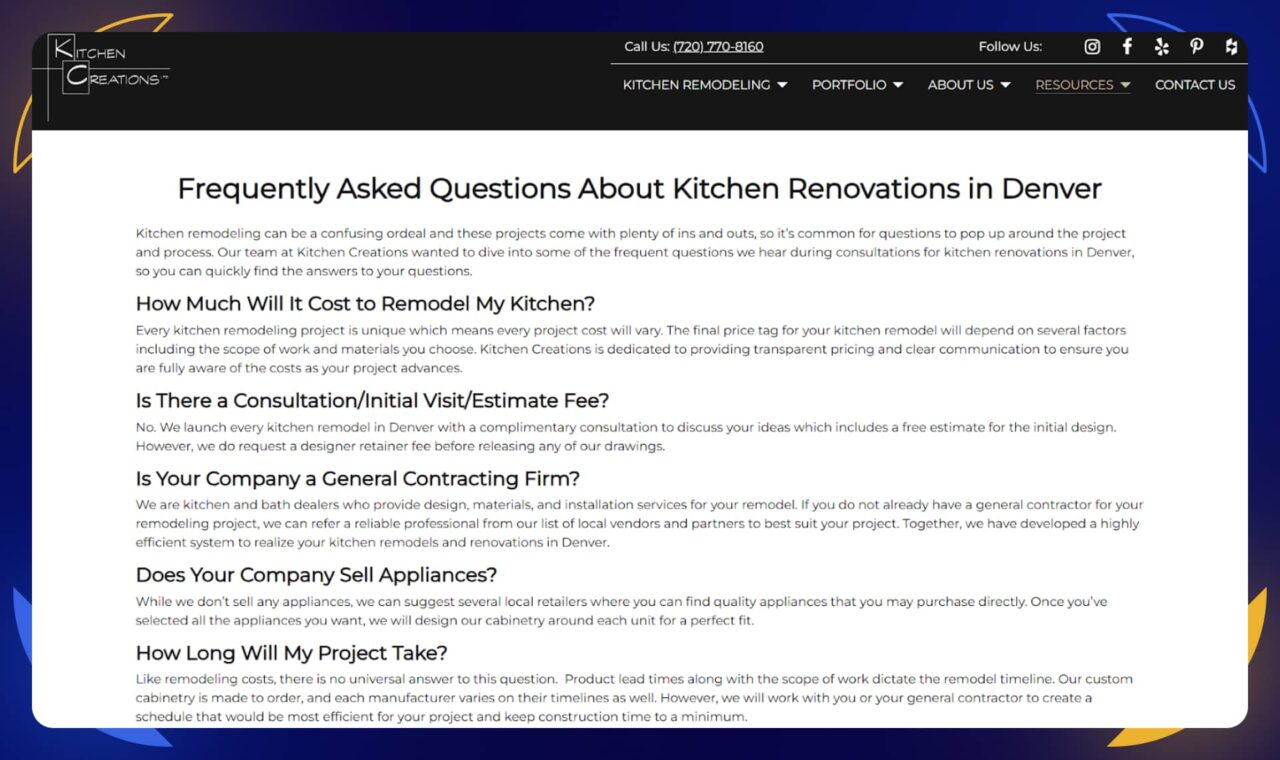
- Optimize your About Us and Contact Us pages
To ensure that AI recognizes your business and its services, you’ll need to check the following:
For your About Us page:- Give a brief description of your business name, location/s, core services or products
- Include years in the business, awards, media mentions, and notable clients
- Apply organization schema with your business name, logo, location/s, and links to social media profiles, enabling AI algorithms to get information about your business.
- Include information about your team, including titles, experience, or testimonials
This one from One Stop Plumbers is a great example:

For your Contact Us page:
- List complete information about your business, including business name, phone number, email, address, and hours of business (this should match with your Google Business Profile)
- Embed a map of your location/s
- Link your contact page in the header or footer of your home page
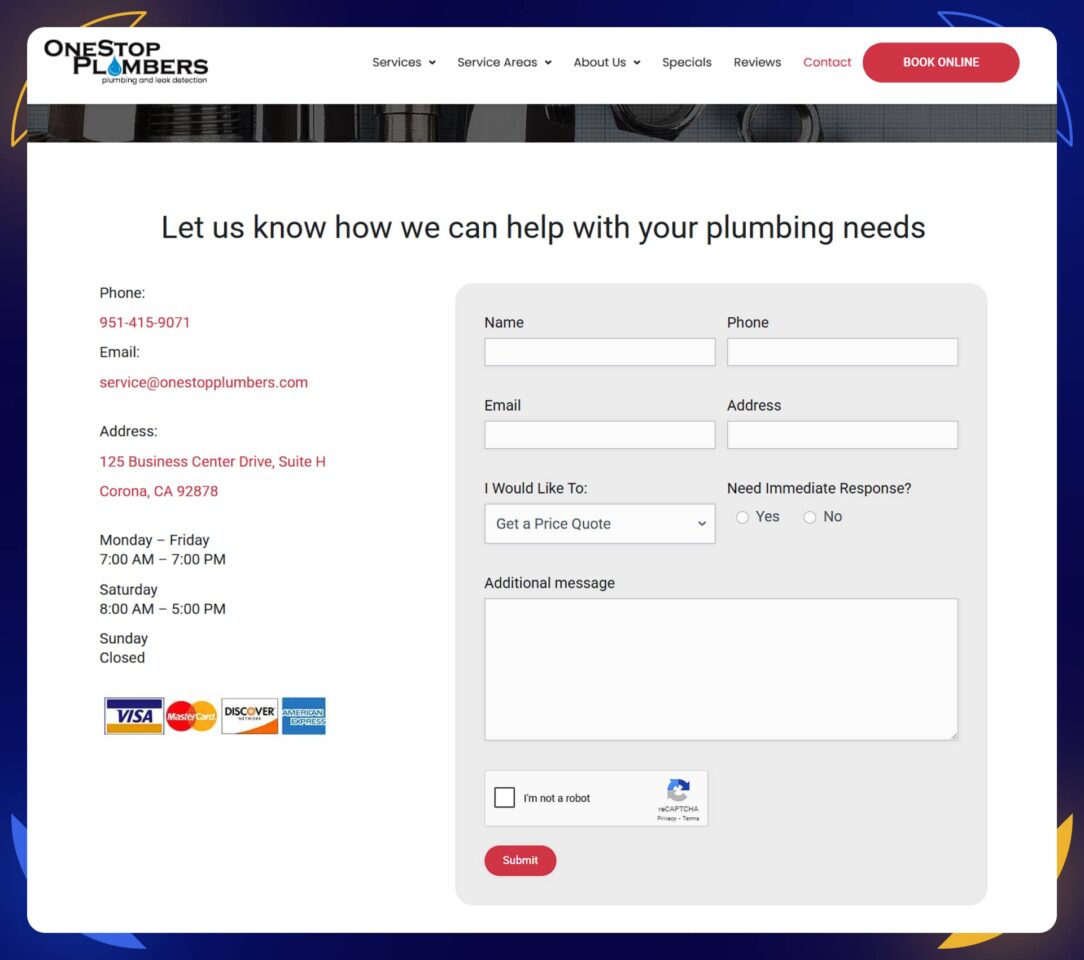
Address Technical SEO Issues
GEO optimizes content, but it also needs a strong technical SEO base to fully be effective.
Where in the past we looked at crawlability, indexability, and stopped at rankability, we now need to add in retrievability. That is, taking extra steps to make sure that core information about our brands is available, accessible, and prioritized for LLMs.
Here’s how to fix common technical problems with your site:
- Make Your Site Mobile-Friendly and Fast: Improve images, use caching, and make sure your site works well on all devices.
- Improve Crawlability and Indexability: Use clear robots.txt files and current XML sitemaps to help AI crawlers. Fix broken links, 404 errors, and redirect chains to make sure content is easy to find and index.
- Use Structured Data (Schema Markup): This helps AI understand your content better. Add markup to articles, products, FAQs, and more. This lets AI show your information correctly.
- Protect Your Site with HTTPS: A safe connection makes users and AI trust your site more. Send all HTTP traffic to HTTPS.
- Improve Core Web Vitals: These measures (Largest Contentful Paint, First Input Delay, Cumulative Layout Shift) affect how users engage with your site and are important for AI.
- Prioritize Clean Code and Site Structure: A neat, well-organized website with clear URLs and links helps AI understand your content better.
Use Multimedia to Address Diverse Search Intents
Multimedia content with visual and interactive elements caters to different preferences and increases the likelihood of your content being chosen by a generative AI to answer a query.
This gallery of roofing jobs from Janney Roofing’s website speaks of the quality of the services this company provided to its past clients:

Optimize for Local Listings
AI search engines also answer location-based queries, so your business listings should also be optimized. Check your Google Business Profile (GBP), Bing Places profile, and other business directory listings and ensure that:
- All business listings have correct and updated information, specifically your business name, address, phone number + website (NAP + W).
- Your GBP features high-quality photos and detailed descriptions that describe your business
- Your GBP has lots of positive customer reviews
Here’s an example of consistent business listings across platforms for Newman Roofing:
Google Maps
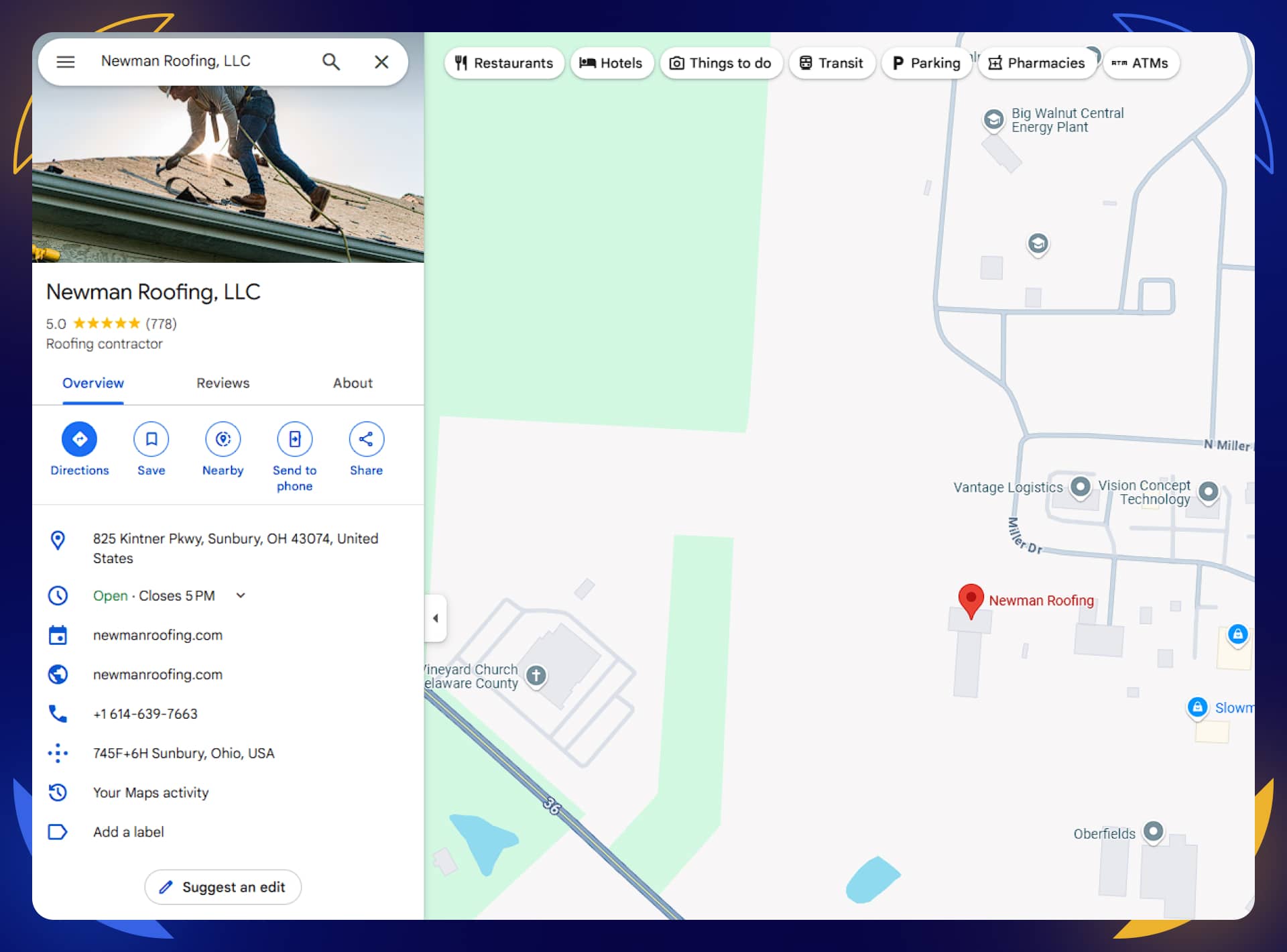
Bing

Yelp

Better Business Bureau

If you haven’t listed your business in any of these platforms, consider doing it today—especially Google Business Profile for Google Maps and Bing Places.
Of course ChatGPT and generative AI tools remain a black box. But based on our client visibilities, the source for the “Local Pack” results you get from local commercial queries appears to be Bing Places. Anecdotally we have observed data discrepancies between our verified Bing Places listings and the results shown, indicating that ChatGPT can also override the data found in Bing Places with information from authoritative industry-specific directories.
While manually syncing Bing Places listing might not increase its visibility, you should still submit your business information to Bing as you may not show up on ChatGPT Local Packs without doing so.
Los Angeles personal injury law firm, Panish Law, was already receiving good traffic for the commercial keyword “car accident lawyer LA” due to their top rankings. That helped him to come on top of ChatGPT searches too.
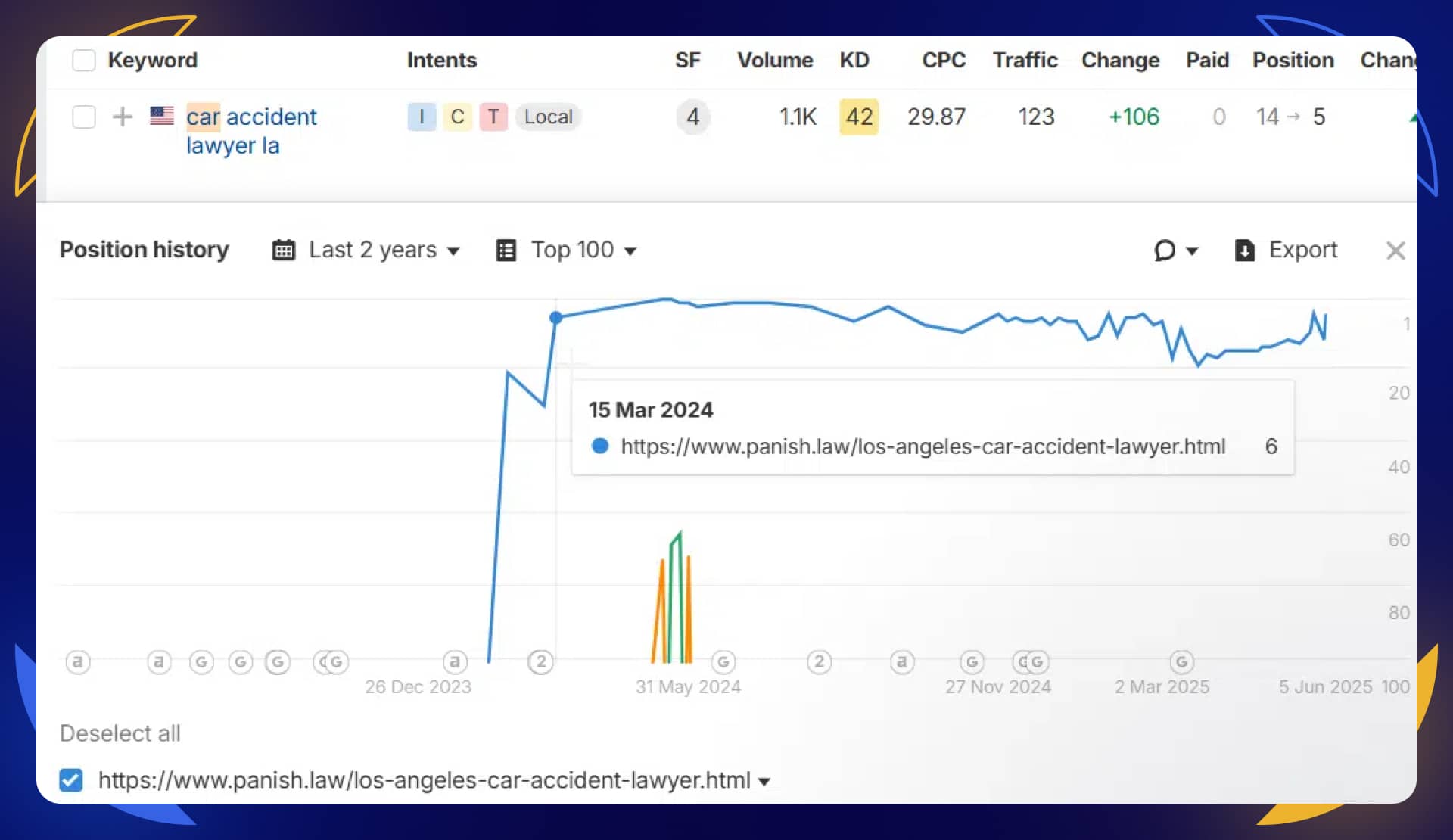
Generally you’ve to rank at the top of Google search. But you can also advertise your firm at the top of reputable directories for law firms—especially ones that receive traffic from commercial searches on Google—to actually can shortcut getting mentioned in ChatGPT.
There are cases our team has seen where the paid listings at the top of Avvo and Forbes significantly boosted rankings for law firms in ChatGPT. Although this can be expensive, it is probably one of the primary sources that OpenAI uses to inform its ranking choices.
Optimize for Different Generative Search Formats
Generative AI presents information in different formats, so tailor your website content to fit all these:
- AI summaries or overviews: Use clear headings, bullet points, and short paragraphs. Put the main points at the beginning so summary tools can find them easily.
Here we have one of our clients, Azizi Law, mentioned in an AI overview response in Google:
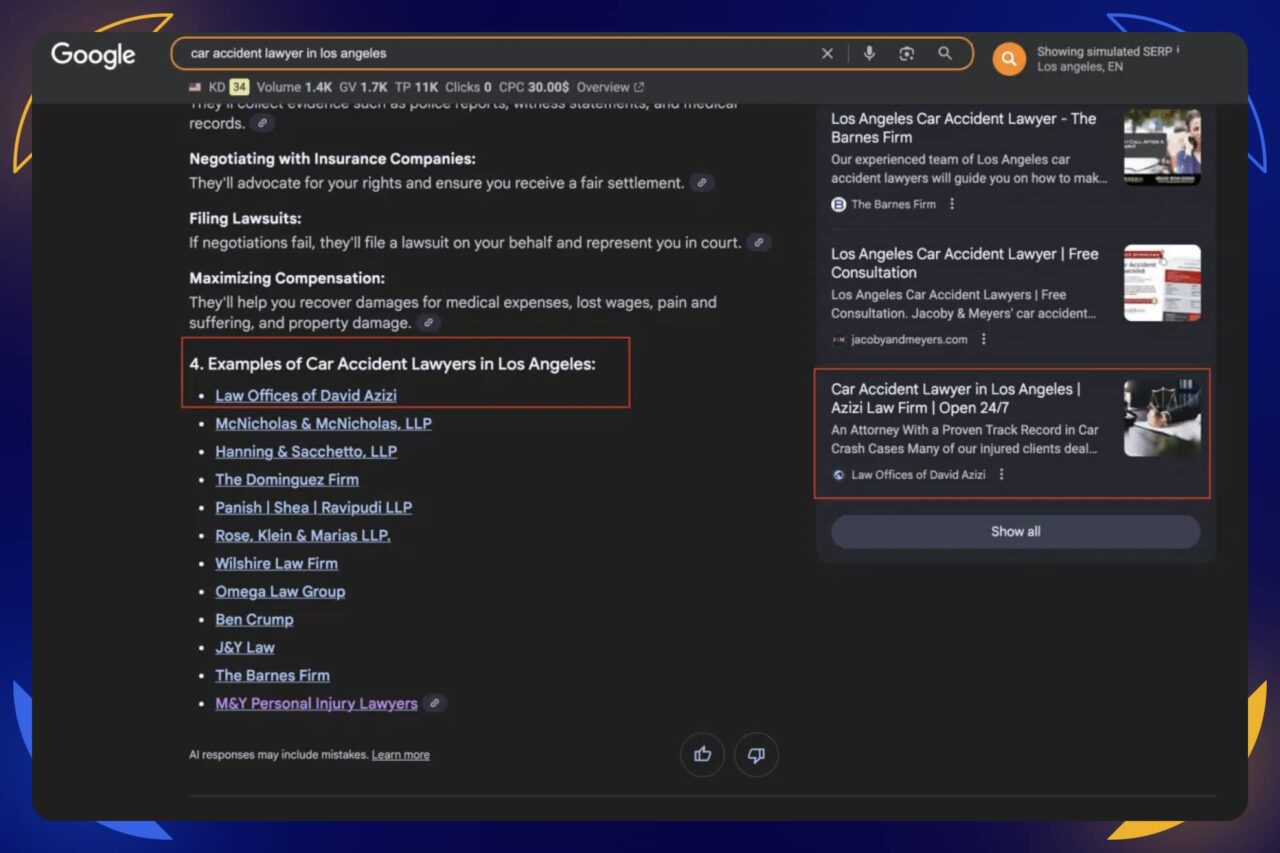
- Chat AI: Write in a friendly, question-and-answer style. Add FAQ sections, clear context, and simple words that chat models can understand and share correctly.
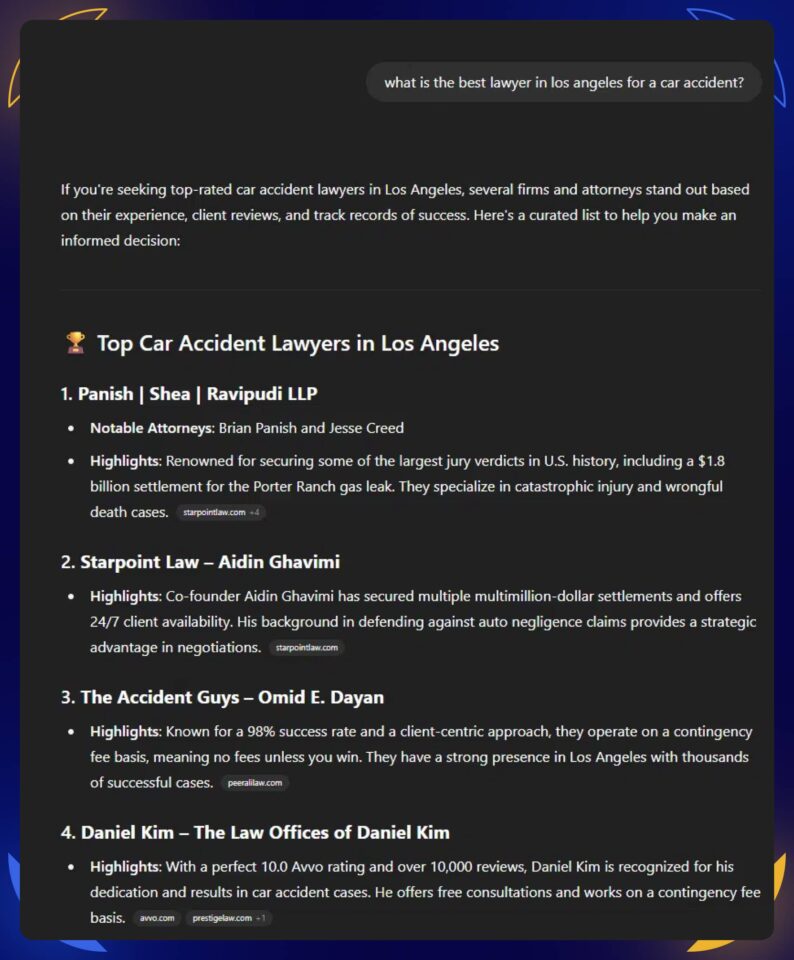
- Location-based AI: Include local keywords like city names and neighborhoods. Use location details and keep local information up-to-date, such as hours, directions, and events, to help nearby users.
Here’s the Dominguez Firm, appearing for a location-based query:
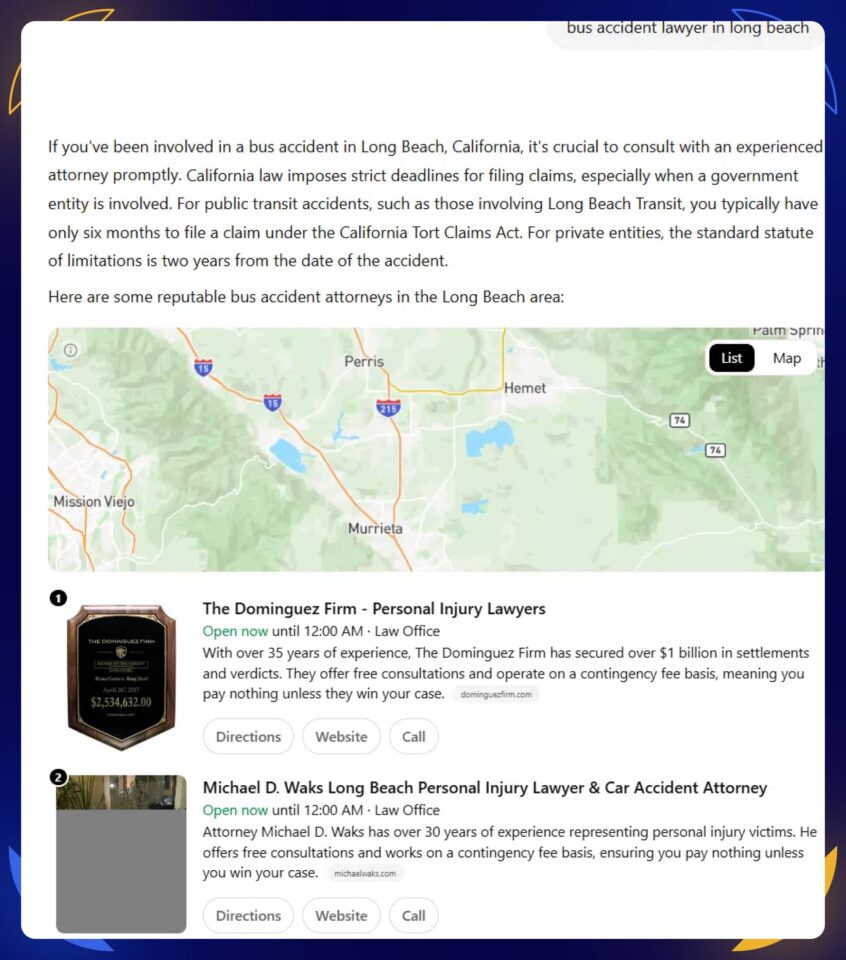
Gather Mentions from Authoritative Sources
A backlink or even just a reputable business mentioning yours can be another factor that helps increase your visibility in generative search.

Just like Google trusts businesses with references from local or industry authorities, AI models rely on who is mentioning a business rather than what the business claims on their own digital properties.

- Build backlinks from high-authority sites
In addition to getting backlinks from online directories, you can nurture your backlink campaign by publishing shareable content like blog posts, infographics, or case studies that other reputable sites would want to link to.
You can proactively find websites, blogs, or directories and send personalized emails to offer the content as a helpful resource from an expert.
You can also be a guest author on trusted sites to naturally get backlinks. SEO tools like Ahrefs or Semrush have a backlink feature that gives you a list of target sites to reach out to, if you want to fast-track this process. - Start a digital PR campaign
Increase your brand visibility by starting a digital PR initiative. You can start by creating interesting stories about your business and sharing them on social media. Then, build relationships with influencers to foster collaborative content and widen your audience reach.
This news article featured local Indiana plumber John Deweese, Sr., who offered expert advice on how to avoid frozen pipes during winter.

Media coverage often leads to high-quality links, which improves the brand’s reputation and its search rankings, so build a media list of local journalists, radio, and TV reporters, then follow and engage with them on social media.
Monitor Updates and Developments in GEO
Monitor announcements from major AI developers (like OpenAI, Google, Anthropic, etc.) to keep your knowledge current on how generative AI engines work.
What we need to focus on, is the point in time where models like ChatGPT stop leaning on existing platforms like Google, and start to innovate on their own with alternative methods to sort rankings.
Learn How AI and GEO Can Help Grow Your Business
As the online world changes, SEO practitioners continuously adapt their methods to use new tools. This includes generative AI.
As with any innovation, being quick to develop new solutions is going to continue to power venture capital investments as well as the overall growth of new startup companies.
By creating high-quality, detailed, and meaningful content, businesses can easily thrive and continue their growth despite notable changes in how content is searched online.
Don’t let your business fall behind. Contact On The Map Marketing today for expert help on how to start optimizing your website for better visibility in generative search engines.
Table of Contents
Related Articles
Dominate Your Market with Digital Marketing Services That Deliver
Talk to a certified professional today, and we will design a strategy specific to your case.






